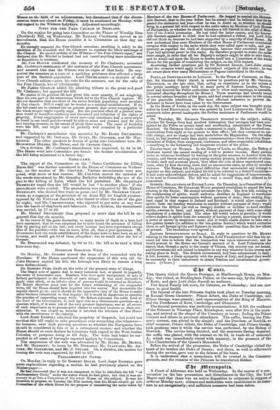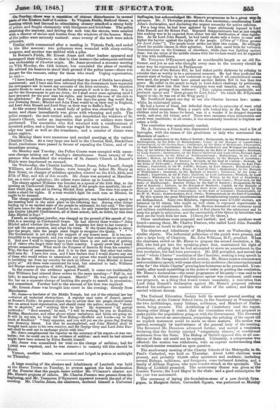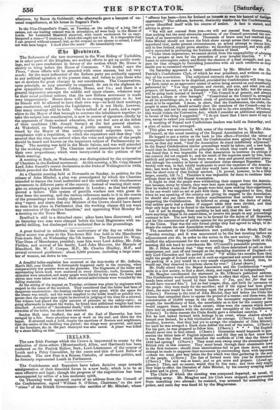Stt Metropolis,
A Court of Aldermen was held on Wednesday. In the course of a con- versation on the late processions and disturbances in the City, the Lord Mayor said that there was an active disposition to cooperate in support of order on Monday next: citizens and authorities were unanimous in an inten- tMn to act energetically; and sufficient measures had been taken. On Sunday, there was a repetition of riotous disturbances in several parts of the Eastern half of London. In Virginia Fields, Bethnal Green a meeting which had listened to stimulating oratory attacked a strong body of police, and fought obstinately with bludgeons and brickbats. The police obtaining the mastery, and driving the mob into the streets, were assailed with a shower of stones and bottles from the windows of the houses. Many of the police were seriously maimed: some twenty of the mob were taken prisoners. Similar strife commenced after a meeting in Viotoria Park, and ended in the like manner: two policemen were wounded with sharp-cutting weapons, and another was stabbed with a pike.
In Bonner's Fields, Mr. Ernest Jones and other leaders appeared and harangued their followers: so that in that instance the subsequent outbreak was undeniably of Chartist origin. Mr. Jones promised a monster meeting on Whit Monday, the 12th instant; but concealed the place of meeting. Be advised his hearers to stand their ground if the police came—there was danger for the runners, safety for those who stood. Urging organization, he said- " I have heard from a very good authority that the men of Dublin have already commenced; and I have also been informed that the Government have requested the newspapers not to insert any accounts of the Irish outbreaks. We therefore require funds to send a man to Dublin to ascertain if such is the case. It is no use for the Government to put me down; for I shall never cease agitating until I have procured for the poor man his rights, and brought the nose of the rich to the grindstone." He promised that in a few days the green flag would float over Downing Street; Mitchel and John Frost would be on their way to England, and Lord John Russell and Lord Grey on their way to Baffin's Bay,"
As the oratory finished, a small body of police was observed in the dis- tance, and chase immediately was given with whooping and yells. The police escaped: the mob turned aside, and demolished the windows of St. James's Church, under an impression that police or soldiers were there garrisoned. The constables who fled returned with a reinforcement of mounted police, and a fierce battle was waged for some time. The sword- edge was used as well as . the truncheon; and a number of rioters were taken captive.
On Monday there were numerous and excited meetings at the various Chartist Clubs. At a very large one held in the Chartist Hall, Blackfriars Road, resolutions were passed in favour of repealing the Union, and of an imntediate arming.
On Monday and Tuesday, the Police Courts were occupied with nume- rous charges arising out of Sunday's disturbances. Some twenty of the persons who demolished the windows of St. James's Church in Bonner's Fields were imprisoned on remand.
On Wednesday, the Chartist leaders, Ernest Jones, John Fussell, Joseph Williams, and Alexander Sharpe, were brought up before Mr. Henry at Bow Street, on charges of seditious speeches, uttered on the 25th, 26th, and 27th of May, and 4th of this month. Mr. Jones was arrested at Manches- ter, on a tour of agitation. the others were taken up in London.
The charge against Williams was founded on a speech of the 25th May, to the meeting on Clerkenwell Green. He had said, if the people rose manfully, the sol- diers would join, and aid in freeing Mitchel from prison. The time was come to make a stand for rights. If a man wouldn't fight for such men as Mitchel, he ought to be damned. The charge against Sharpe, a copperplate-printer, was founded on a speech to the meeting held in the same place on the following day. Among other things leading up to an excited state of the people he addressed, he had said, "The time will soon come for the people of London to act; for only yesterday there marched into Dublin 150,000 Confederates, all of them armed; and, no doubt, by this time Jahn Mitchel is free! "
Fussell, an intelligent jeweller, was charged on the ground of his speech of the 29th to a meeting on Clerkeawell Green. He had uttered these words—" John Mitchel asked whether the Queen had not forgotten her duty to her country: I now ask the same question, and adopt his views. If the Queen forgets to recog- nize the people, then the people must forget to recognize the Queen. * • * The Government is not worthy the support of any honest man. It is too con- temptible to be recognized; and you must use your best endeavours to overthrow it. And now I wish to impress upon you that there is one safe way of getting rid of rulers who forget their duty to their country. I openly avow that I mean private assassination. What made the Emperor of Austria fly from his country? Why, the fear of assassination. And it is by that means that other bad rulers shall soon fly. I have five sons, and I here declare that I would disown any one of them who would refuse to assassinate any person who would be instrumental in banishing me from my country for such an offence as John Mitchel is found guilty of." All three were committed for trial, but admitted to bail; Williams and Sharpe under penalties of 4001., Fussell, 6001.
In the coarse of the evidence against Fussell, it came out incidentally that Williams had uttered these orders to the same meeting—" Fall in, my lads; in marching order: four abreast.. March!" He was placed again at the bar on a separate charge of inciting the people to march in procession; and committed. Further bail to the amount of his first was required.
Mr. Ernest Jones was brought into court in the evening; directly from Manchester.
Mr. Jones—a barrister of the Middle Temple, but not of the criminal law bar —waived all technical obstructions. A reporter read notes of Jones's speech at Bonner's Fields: its general object was to advise that the people should enter into an armed local organization, and should resist the police; standing "shoul- der to shoulder," and "striking blow for blow." He deprecated "all partial outbreaks." "Rest assured," he said "I will be working for you in Bradford, Halifax, Manchester, and other places where turbulence and broils are going on. It will be my aim to bring the West Riding—Sheffield and Leeds—up to the mark of Bradford." "Only organize, and you will yet see the green flag floating over Downing Street. Let that be accomplished, and John Mitchel shall be brought back again to his own country, and Sir George Grey and Lord John Rus- sell shall be sent out to exchange places with him."
Mr. Jones complimented the reporter on the accuracy of his report—it was ver- batim; but he could see in it no evidence of sedition: each word he had uttered might have been uttered by Elihn Burritt himself. Mr. Jones was committed for trial on the charge of sedition; bail for 1,0001. was required, and he was remove' in custody till this should be found.
Vernon, another leader, was arrested and lodged in prison at midnight on Thursday.
A large meeting of the electors and inhabitants of Lambeth was held at the Horns Tavern on Tuesday, to protest against the late declaration of the Premier that the people desire neither Mr. O'Connor's charter nor Mr. Hume's projects of reform. Mr. Charles Pearson was present from the beginning, and Mr. Tennyson D'Eyncourt appeared towards the end of the meeting. Mr. Charles Jones, the chairman, declared himself a Universal
Suffragist, but acknowledged Mr. Hume's programme to be a great step in advance. Mr. J. Thwaites proposed the first resolution; condemning Lord John's declaration, and declaring the urgent necessity for active reforms. For a long time he had been agitated by hopes alternately reposed in Lord John Russell and Sir Robert Peel. Repeated disappointments had at last taught him nothing was to be expected from either but the fortification of class legisla- tion. As for Lord John Russell, he had lately shown only a desire to raise still higher the barrier against the rights of the people. (Cries of "Three roans for Lord John! ") The people must strike out their own course. He willingly joined the middle classes in their agitation. Lord John cared little for turbulent demonstrations on the Common or elsewhere, while class was fighting against class: but the union of the middle classes with the workers would not be regarded by him with indifference.
Mr. Tennyson D'Eyncourt spoke at considerable length as an old Re- former, and yet as one who thought every man in the country should some way be represented in Parliament.
At the time of the Reform Bill, he had risked public disfavour by refusing to consider that as worthy to be a permanent measure. He had then predicted the present state of feeling: he now undertook to say that if all constitutional means were used, the people would have gained another Reform Bill in less than two years. He called on the people to reply to Lord John's challenge by petitioning. They should show him that their complaints were well founded, and he would join them in getting them redressed. [This opinion seemed unpalatable, and produced uproar and "three groans for Lord John." On which Mr. D'Eyncourt begged to say, he was not of the Whig party.]
Mr. Southwell hoped one day to see the Charter become law: mean- while, he cultivated union.
He had a horror of blood, but defended those who in extremity of want cried out for violent measures. When a man's wife looked him in the face and his children cried on his knees for bread, was it a wonder if he dropped desperate words, and even did violent acts? There were extremes when insurrection and revolt were justifiable; at all events, it was occasionally beneficial to fright= our rulers a little.
The resolution was unanimously carried.
Mr. A. Stevens, a Friend, who deprecated violent measures, read a list of boroughs, with the names of the gentleman or lady who nominated the Members of each— Arundel, nomination by the Duke of Norfolk ; Bridgenorth, by the Whitmore family; Buckingham, by the Duke of Buckingham; Caine, by the Marquis of Lausdowne ; Christchurch, by Sir George Rose ; Chichester, by the Duke of Richmond ; Cirencester, by Earl Bathurst ; Dorchester, by the Earl of Shaftesbury and Williams the bankers ; Eye, by Sir Edward Kerrison; Great Grimsby, by the Earl of Yarborough i neistone, by Lady Bassett ; Iluntingdou, by the Earl of Sandwich and Lady Olivia Bernard Spar- row ; Launceston, by the Duke of Northumberland ; bialmesbury, by the Earl of Suffolk ; Melton, by Earl Fitawilliam ; Marlborough, by the Marquis of Aylesbury; Midhurst, by the Marquis of Exeter ; klorpeth, by the Earl of Carlisle; Newark, NT the Duke of Newcastle ; Pembroke, by Sir John Owen; Peterborough, by Earl Fils- william ; Petersdeld, by Sir W. Jolliffe ; Reigate, by Earl Somers, Richmond (York- shire), by the Earl of Zetland ; Ripon, by Earl de Grey ; Shaftesbury, by the Marquis of Westminster ; Stamford, by the Marquis of Exeter ; Tavistock, by the Duke of Bedford ; Tamworth, by Sir R. Peel; Thetford, by Lord Ashburton; Wenlock, by Lord Forester ; Whitehaven, by the Earl of Lonsdale ; Wilton, by the Earl of Pembroke ; Winchester, by the Duke of Buckingham ; Windsor, by the Castle ; Wood,tock, by the Duke of Marlborough ; Bandon Midge, by the Earl of Bandon ; Dungannon, by the Earl of Ranfurly ; Lisburn, by the Marquis of Hertford ; Cardiff, by the Marquis of Bute or his representatives. In counties there were—Anglesea, nominated by the Marquis of Anglesea ; West Cumberland, by the Earl of Lousdale ; Denbighshire, by Sir W. W. Wynn; Pembrokeshire, Sir J. Owen; Westmoreland, by the Earl of Lounge. By this system the great Metropolitan and Manufacturing county constituencies are disfranchised. Sixty-two Members, representing some 279,260 electors, are balanced by 62 others, who might as well claim to represent departments in France as real constituencies here. Mr. Steveus denounced our enormous naval and military establishments, maintained to find places for the aristocracy and to keep the people in subjection; and the surrounding of the Queen by favourites who shut out the truth from her ears. (Cheers for the Queen.) Other resolutions were proposed and carried; and other speakers were heard—among them, Mr. Charles Pearson, who called Lord John Russell's declaration an insult to the people.
The electors and inhabitants of Marylebone met on Wednesday, with similar objects. The influential politicians of the parish were present, ani also a large body of Chartists. Mr. John Williams, M.P., presided. Whea the chairman called on Mr. Hume to propose the second resolution, a Mr. Hill, who had got into the speaking-place first, maintained his right of precedence; alleging that lie had attempted to move an amendment to the first resolution, but had been prevented. Mr. Hill prevailed, and moved the usual "whole Charter" resolution of the Chartists; making a long speech in its favour. Mr. Savage seconded this motion. Mr. Hume made a remonstrant and conciliatory speech, with some effect on his audience; the interruptions and cries for" the whole Charter" growing less boisterous as he proceeded. Even- tually, after much squabbling on the point of order in putting the resolution, Mr. Hume's declaration—the usual programme of his party—was said to be carried. A violent scene of disputatious uproar was continued, until Some one proposed, as a thing that would restore unanimity, a resolution that Lord John Russell's declaration against Mr. Hume's proposed reforms showed his unfitness to conduct the affairs of the nation; and this was carried without dissent.
The National Education Society held its annual general meeting on Wednesday, at the Central School-room, in the Sanctuary at Westminster; the two Archbishops, many bishops, noblemen, and Members of Parlia- ment, being present. The Archbishop of Canterbury read the report. Among other things it stated, that the Committee were not prepared. to make public the negotiations going on with the Government. The Reverend F. Sagden moved an amendment, postponing the printing of the report tt11 an explicit statement could be made on these matters. His motion WU carried, seemingly by inadvertence of the general body of the meeting. The Reverend Mr. Dennison advanced further, and moved a resolution declaring that the Society rejected "compulsory clauses," or conditional assistance from the State. The Bishop of Oxford opposed this, as all con- ditions of State aid could not be rejected. Ultimately, a compromise was effected: the motion was withdrawn, with an express understanding that its subject-matter remained an open question.
The anniversary meeting of the Charity Schools of the Metropolis, in St. Paul's Cathedral, was held on Thursday. About 5,000 children were present, and probably 10,000 other spectators and auditors; including several Bishops, noblemen, and foreigners, some turbaned Asiatics, and, a family of African Negroes, who were wonder-struck at the spectacle. The Bishop of Lichfield preached. The anniversary dinner was given at the London Tavern; the Lord Mayor in the chair: and a good subscription for the year was announced.
The ceremony of laying the foundation-stone of a new Jewish Synn gogne, in Margaret Street, Cavendish Square, was performed on Monday
afternoon, by Baron de Goldsmid; wbo afterwards gave a banquet of un- usual magnificence, at his house in Regent's Park.
In the Vice-Chancellor's Court, on Tuesday, on the calling of a long list of causes, not one leading counsel was in attendance, all were busy in the House of Lords. Sir Launcelot Shadwell observed, with much excitement for so easy- tempered a man—" I must say, I think this ought not to be. It is impossible that I can proceed without counsel; but, as the counsel do not choose to attend, I shall not wait here longer. I shall close the court." He immediately rose.




























 Previous page
Previous page